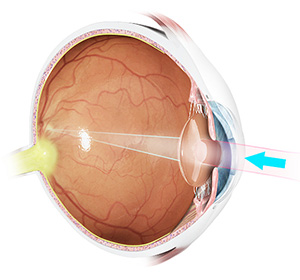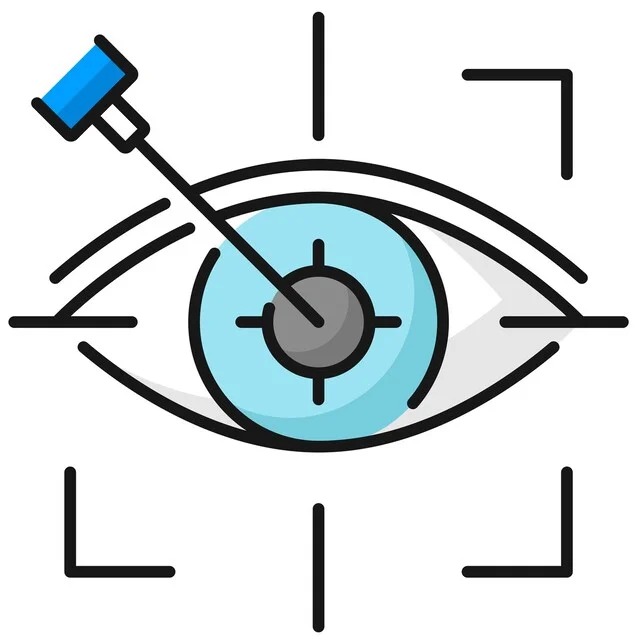
What is Refractive Laser Surgery?
Refractive laser surgery is a surgical procedure performed to correct refractive errors and improve vision. The main objective of the refractive laser surgery is to eliminate or reduce the need for contact lenses or eyeglasses.
Refractive errors are common vision problems in which your eyes are not able to focus clearly on an object. It occurs when light rays from an object do not focus correctly on the retina (light-sensitive inner back layer of the eye). Blurred vision is the most common symptom of refractive error, while impairment of vision may occur in severe cases. You may also experience other symptoms such as headache, squinting, double vision, or eye strain.
Types of Refractive Errors
Refractive errors are classified as follows:
- Myopia or nearsightedness: Light rays are focused in front of the retina, thereby causing distant objects to appear blurred.
- Hyperopia or farsightedness: Light rays are focused behind the retina and cause nearby objects to appear blurred.
- Astigmatism: Irregularly curved cornea (dome-shaped front part of the eye) causes light rays to get distorted, affecting distant and near vision.
- Presbyopia: Age-related difficulty in focusing on objects at arm’s distance.
Who is a Good Candidate for Refractive Laser Surgery?
Refractive laser surgery is not a good option for everyone. To qualify for laser eye surgery, you should meet the below-mentioned qualifications:
- You should be at least 18 years old.
- You should have had stable vision for at least 1 year.
- You should have had the same contact lenses and eyeglasses prescription for the last 2 to 3 years.
- You should not be pregnant or nursing.
- You should not have a history of active corneal disease.
- You should not be diabetic or have glaucoma or other eye conditions.
Preparation for Refractive Laser Surgery
Most refractive laser surgeries are performed on an outpatient basis and take less than an hour, so you will not require an overnight stay in the hospital and can go home the same day. In general, the preparation for surgery involves the following:
- A complete eye exam is performed prior to scheduling surgery.
- Do not apply eye makeup for at least 2 days prior to surgery.
- If you are using contact lenses, do not insert them before surgery.
- A general health assessment is reviewed to check for any active health conditions.
- A review of all the medications and supplements you may be taking is discussed.
- You should arrange for an escort as you will not able to drive home yourself post surgery.
- A written consent will be obtained from you after the surgical process has been explained in detail.
Procedure and Types of Refractive Laser Surgeries
Refractive errors can be treated with various types of refractive laser eye surgeries. In general, all vision correction surgeries involve reshaping the cornea with the help of anaesthetic eye drops to numb the eyes and a speculum to keep the eye open. Some may require the replacement of the natural lens of the eye. Based on your eye examination, your eye doctor may recommend any of the following surgeries to improve your vision:
LASIK (Bladeless)
Laser-assisted in-situ keratomileusis is a laser surgery useful in correcting vision abnormalities such as nearsightedness, farsightedness, and/or astigmatism. During a LASIK surgery, a flap is made in the outer layer of the cornea. This flap provides access to the underlying tissue of the cornea, which is reshaped in order to make the cornea focus light onto the retina. The flap can be made using a blade or a laser beam. Bladeless LASIK has been associated with faster recovery.
PRK
Photorefractive keratectomy (PRK) is a laser surgery useful in correcting mild-to-moderate nearsightedness, farsightedness, and/or astigmatism. During PRK surgery, an excimer laser is passed over the corneal surface to reshape the cornea. Wavefront Technology may be used with PRK.
LTK
LTK (laser thermal keratoplasty) is a technique for reshaping your cornea to assist you to see better without corrective lenses or glasses. This is a procedure that utilises a holmium laser to gently heat certain areas of the cornea in order to shrink the outer part of the cornea to make the central cornea steeper.
Bioptics
Bioptics is a combination of two techniques, LASIK and lens implantation, which are used to correct extreme refractive errors. Your doctor may suggest bioptics if you have farsightedness greater than +4 dpt or nearsightedness greater than -8 dpt. The first procedure involves creating a corneal flap and implantation of a lens in addition to your own lens. The second procedure of LASIK is performed around 6 weeks to 3 months after lens implantation. The flap created is lifted and laser is used to make fine corrections to the refractive error.
Postoperative Care and Instructions for Refractive Laser Surgery
Postoperative care and instructions will include the following:
- You should wear an eye shield for several nights to protect your eyes from rubbing.
- Anti-inflammatory and antibiotic eye drops are prescribed to minimise the risk of infection, dry eye, or inflammation.
- You must avoid dusty environments or wearing eye makeup for at least a week.
- Contact sports, bathtubs, and swimming should be avoided for at least a week.
- Call your doctor immediately if you experience pain, discharge, or redness in the eye or any other problems.
- Strictly adhere to the scheduled follow-up appointments to monitor your progress.
Risks and Complications of Refractive Laser Surgery
Refractive laser eye surgery is a relatively safe procedure; however, as with any surgery, there are risks and complications that could occur, such as:
- Infection
- Dry eyes
- Blurred vision
- Eye sensitivity
- Corneal scarring
- Excessive corneal thinning
- Overcorrection or undercorrection
FAQ's - Regarding Refractive Laser Surgery
Does NHS Cover Refractive Laser Surgery?
Refractive laser surgery, often sought after to correct common vision issues like near-sightedness, far-sightedness, and astigmatism, is not typically covered by the NHS in the UK. The NHS typically covers treatments that are considered medically necessary, and refractive surgery is often considered an elective procedure aimed at improving quality of life rather than addressing a medical condition.
While the NHS may cover eye care for conditions like cataracts, glaucoma, or diabetic retinopathy, refractive laser surgery falls outside the scope of these conditions. Patients interested in such procedures usually have to opt for private healthcare services and pay out of pocket for the surgery.
How Much Does Eye Refractive Laser Surgery Cost in the UK?
Refractive laser eye surgery cost in the UK can vary depending on various factors, including the specific procedure performed, the technology used, the surgeon’s experience, and the location of the clinic or hospital. On average, the cost of refractive laser eye surgery in the UK ranges from £1,000 to £3,000 per eye.
Advanced techniques such as LASIK (Laser-Assisted In Situ Keratomileusis) or PRK (Photorefractive Keratectomy) tend to be more expensive than traditional procedures. Additionally, clinics offering the latest technology or personalised treatment plans may charge higher fees.
It’s essential for patients considering laser refractive eye surgery to inquire about the all the services included in the cost to make an informed decision. This comprehensive approach, coupled with his extensive experience, is why Mr. Mo Majid’s highly successful practice continues to receive a significant number of referrals for this procedure.
How Successful Is Refractive Laser Surgery in the UK?
Refractive laser surgery has a high success rate in the UK, with many patients experiencing significant improvements in their vision and quality of life after undergoing these procedures. LASIK and PRK, two of the most commonly performed types of refractive laser surgery, have been refined over the years, leading to improved outcomes and patient satisfaction.
The success of refractive laser surgery depends on various factors, including the patient’s eye health, the severity of their refractive error, the skill of the surgeon, and adherence to post-operative care instructions. When performed by experienced ophthalmic surgeons like Mr. Magic, using state-of-the-art equipment and techniques, refractive laser surgery can yield excellent results.
Patients contemplating refractive laser surgery can seek a consultation with Mr. Mo Majid, a distinguished and proficient ophthalmologist. During the consultation, Mr. Mo Majid, an expert in the field, will evaluate their suitability for the procedure and engage in a comprehensive discussion regarding the associated risks and benefits.
What Are the Benefits of Refractive Laser Surgery?
Refractive laser surgery offers several benefits for individuals seeking to reduce their dependence on corrective eyewear and improve their overall vision:
- Reduced Dependence on Glasses or Contact Lenses: One of the primary benefits of refractive laser surgery is the potential to achieve clearer vision without the need for glasses or contact lenses. Many patients experience freedom from corrective eyewear following successful surgery.
- Improved Quality of Life: Enhanced vision can significantly improve an individual’s quality of life, allowing them to participate in activities such as sports, outdoor hobbies, and everyday tasks without the hindrance of glasses or contacts.
- Convenience: Refractive laser surgery eliminates the hassle of dealing with glasses or contact lenses, including the ongoing costs of prescription updates, cleaning supplies, and replacements. This added convenience can save time and money in the long run.
- Quick Recovery: Most patients experience a relatively quick recovery period after refractive laser surgery, with many returning to normal activities within a few days to a week. The procedure typically involves minimal discomfort, and vision improvements are often noticeable within a short time frame.
- Long-lasting Results: Refractive laser surgery offers long-lasting vision correction for many patients, reducing the need for frequent adjustments to eyeglass prescriptions. While individual results may vary, the majority of patients enjoy stable vision outcomes for years following surgery.
Refractive laser surgery stands as a remarkable breakthrough in ophthalmology, providing patients with a safe, efficient, and enduring means of vision correction. As technology progresses, novel techniques and advancements continuously emerge, bolstering the accuracy and efficacy of these procedures.







